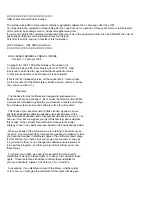
Chapter 26: Multiple VLAN Modes
298
Section VI: Virtual LANs
802.1Q- Compliant Multiple VLAN Mode
In this mode, each port is placed into a separate VLAN as an untagged
port. The VLAN names and VID numbers are based on the port numbers.
For example, the VLAN for port 4 is named Client_VLAN_4 and is given
the VID of 4, the VLAN for port 5 is named Client_VLAN_5 and has a VID
of 5, and so on.
The VLAN configuration is accomplished automatically by the switch. After
you select the mode and an uplink port, the switch forms the VLANs. It
also assigns the PVID values as well. For example, the PVID for port 4 is
assigned as 4, to match the VID of 4.
A user-designated port on the switch functions as an uplink port, which
can be connected to a shared device such as a router for access to a
WAN. This port is placed as a tagged port in each VLAN. Thus, while the
switch ports are separated from each other in their individual VLANs, they
all have access to the uplink port.
The uplink port also has its own VLAN, where it is an untagged member.
This VLAN is called Uplink_VLAN.
Note
In 802.1Q Multiple VLAN mode, the device connected to the uplink
port must be IEEE 802.1Q-compliant.
An example of the 802.1Q-compliant VLAN mode is shown in Table 84.
The table shows the VLANs on the AT-9400 Switch where port 22 has
been selected as the uplink port.
Table 84. 802.1Q-Compliant Multiple VLAN Example
VLAN Name
VID
Untagged Port
Tagged Port
Client_VLAN_1
1
1
22
Client_VLAN_2
2
2
22
Client_VLAN_3
3
3
22
Client_VLAN_4
4
4
22
Client_VLAN_5
5
5
22
Client_VLAN_6
6
6
22
Client_VLAN_7
7
7
22
Client_VLAN_8
8
8
22
Client_VLAN_9
9
9
22
Summary of Contents for AT-S63
Page 14: ...Figures 14 ...
Page 18: ...Tables 18 ...
Page 28: ...28 Section I Basic Operations ...
Page 58: ...Chapter 1 Overview 58 ...
Page 76: ...Chapter 2 AT 9400Ts Stacks 76 Section I Basic Operations ...
Page 96: ...Chapter 5 MAC Address Table 96 Section I Basic Operations ...
Page 114: ...Chapter 8 Port Mirror 114 Section I Basic Operations ...
Page 116: ...116 Section II Advanced Operations ...
Page 146: ...Chapter 12 Access Control Lists 146 Section II Advanced Operations ...
Page 176: ...Chapter 14 Quality of Service 176 Section II Advanced Operations ...
Page 196: ...196 Section III Snooping Protocols ...
Page 204: ...Chapter 18 Multicast Listener Discovery Snooping 204 Section III Snooping Protocols ...
Page 216: ...Chapter 20 Ethernet Protection Switching Ring Snooping 216 Section III Snooping Protocols ...
Page 218: ...218 Section IV SNMPv3 ...
Page 234: ...234 Section V Spanning Tree Protocols ...
Page 268: ...268 Section VI Virtual LANs ...
Page 306: ...Chapter 27 Protected Ports VLANs 306 Section VI Virtual LANs ...
Page 320: ...320 Section VII Internet Protocol Routing ...
Page 360: ...Chapter 30 BOOTP Relay Agent 360 Section VII Routing ...
Page 370: ...Chapter 31 Virtual Router Redundancy Protocol 370 Section VII Routing ...
Page 372: ...372 Section VIII Port Security ...
Page 402: ...Chapter 33 802 1x Port based Network Access Control 402 Section VIII Port Security ...
Page 404: ...404 Section IX Management Security ...
Page 436: ...Chapter 36 PKI Certificates and SSL 436 Section IX Management Security ...
Page 454: ...Chapter 38 TACACS and RADIUS Protocols 454 Section IX Management Security ...
Page 462: ...Chapter 39 Management Access Control List 462 Section IX Management Security ...
Page 532: ...Appendix D MIB Objects 532 ...
















































